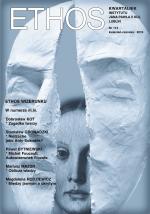 zobacz powiększenie | DOI 10.12887/29-2016-2-114-06 Anna TYLIKOWSKA - Personal Image as a Mask Cena brutto: 7,00 PLN |
|
The idea of personal public image that people present to others corresponds with the psychological concept of self-presentation. Theories of self-presentation concentrate on motives, strategies and effectiveness of behaviours aiming to impression management, and partly neglect deeper, complicated psychological mechanisms, mostly non-personal determinants, and far-reaching, also ethical, consequences of the creation and usage of personal image in social world. Descriptions of such mechanisms, determinants, and consequences are offered by theories of a mask or persona that were initiated by Carl Gustav Jung and are still being developed. Psychological theories of a mask, having a broader range of description and explanation than self-presentation theories, indicate and discuss a variety of determinants of constructing and using a mask, usually defined as a part of personality that represents the self in social reality. These determinants can be categorized as evolutional, existential, historical, cultural, social and individual. The creation and usage of a mask is based on specific emotional, motivational and cognitive processes. A mask is an instrument of the presentation of the self in the outer world. It protects the self. It also shapes personal image of one’s self. Wearing a mask may have various consequences, both negative and positive, all of them having an ethical aspect. The most important are: inability to build authentic relationships, inhibition of personal development, and mental disorders. The positive results of wearing a mask are mostly developmental: using a mask supports the processes of acquiring knowledge about one’s individuality and social reality. Contemporary mass societies seem to favour an ethos of creating public self-images that does not encourage developmental changes of a personal mask. Such an ethos may cause rigidness of individual masks, effecting in a low quality of life, both personal and social. In this context, Jung’s postulate to recognize one’s own mask is gaining additional ethical power. Key words: mask, persona, self-presentation, public self-image, personal development, interpersonal relationships, culture Contact: Chair of Psychology, Pedagogical University of Cracow, E-mail: antylikowska@gmail.com Pliki do pobrania: » 114_Tylikowska.pdf | |
